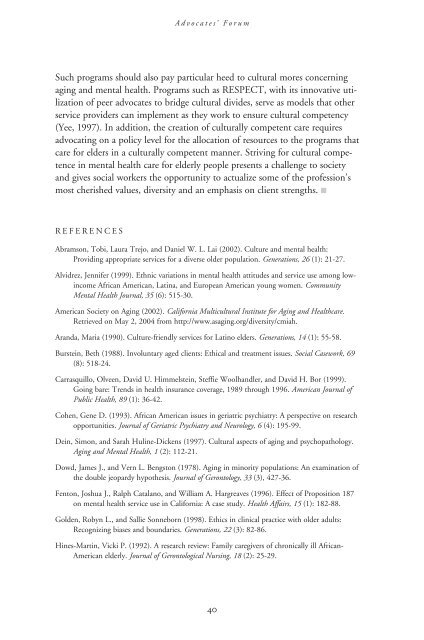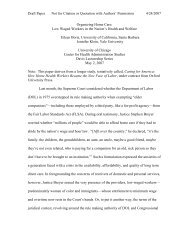2004 - School of Social Service Administration - University of Chicago
2004 - School of Social Service Administration - University of Chicago
2004 - School of Social Service Administration - University of Chicago
You also want an ePaper? Increase the reach of your titles
YUMPU automatically turns print PDFs into web optimized ePapers that Google loves.
Advocates’ Forum<br />
Such programs should also pay particular heed to cultural mores concerning<br />
aging and mental health. Programs such as RESPECT, with its innovative utilization<br />
<strong>of</strong> peer advocates to bridge cultural divides, serve as models that other<br />
service providers can implement as they work to ensure cultural competency<br />
(Yee, 1997). In addition, the creation <strong>of</strong> culturally competent care requires<br />
advocating on a policy level for the allocation <strong>of</strong> resources to the programs that<br />
care for elders in a culturally competent manner. Striving for cultural competence<br />
in mental health care for elderly people presents a challenge to society<br />
and gives social workers the opportunity to actualize some <strong>of</strong> the pr<strong>of</strong>ession’s<br />
most cherished values, diversity and an emphasis on client strengths. ■<br />
REFERENCES<br />
Abramson, Tobi, Laura Trejo, and Daniel W. L. Lai (2002). Culture and mental health:<br />
Providing appropriate services for a diverse older population. Generations, 26 (1): 21-27.<br />
Alvidrez, Jennifer (1999). Ethnic variations in mental health attitudes and service use among lowincome<br />
African American, Latina, and European American young women. Community<br />
Mental Health Journal, 35 (6): 515-30.<br />
American Society on Aging (2002). California Multicultural Institute for Aging and Healthcare.<br />
Retrieved on May 2, <strong>2004</strong> from http://www.asaging.org/diversity/cmiah.<br />
Aranda, Maria (1990). Culture-friendly services for Latino elders. Generations, 14 (1): 55-58.<br />
Burstein, Beth (1988). Involuntary aged clients: Ethical and treatment issues. <strong>Social</strong> Casework, 69<br />
(8): 518-24.<br />
Carrasquillo, Olveen, David U. Himmelstein, Steffie Woolhandler, and David H. Bor (1999).<br />
Going bare: Trends in health insurance coverage, 1989 through 1996. American Journal <strong>of</strong><br />
Public Health, 89 (1): 36-42.<br />
Cohen, Gene D. (1993). African American issues in geriatric psychiatry: A perspective on research<br />
opportunities. Journal <strong>of</strong> Geriatric Psychiatry and Neurology, 6 (4): 195-99.<br />
Dein, Simon, and Sarah Huline-Dickens (1997). Cultural aspects <strong>of</strong> aging and psychopathology.<br />
Aging and Mental Health, 1 (2): 112-21.<br />
Dowd, James J., and Vern L. Bengston (1978). Aging in minority populations: An examination <strong>of</strong><br />
the double jeopardy hypothesis. Journal <strong>of</strong> Gerontology, 33 (3), 427-36.<br />
Fenton, Joshua J., Ralph Catalano, and William A. Hargreaves (1996). Effect <strong>of</strong> Proposition 187<br />
on mental health service use in California: A case study. Health Affairs, 15 (1): 182-88.<br />
Golden, Robyn L., and Sallie Sonneborn (1998). Ethics in clinical practice with older adults:<br />
Recognizing biases and boundaries. Generations, 22 (3): 82-86.<br />
Hines-Martin, Vicki P. (1992). A research review: Family caregivers <strong>of</strong> chronically ill African-<br />
American elderly. Journal <strong>of</strong> Gerontological Nursing, 18 (2): 25-29.<br />
40
















